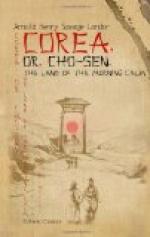But let us return to the Corean family. The mother, practically from the beginning, is a nobody in the household, and is looked upon as a piece of furniture or a beast of burden by the husband, according to his grade, and as an ornament to the household, but nothing more by her own sons. Her daughters, if she has any, regard her more as a friend or a companion, sharing the lonely hours and helping her with her work. The women never take part in any of the grand dinners and festivities in which their husbands revel, nor are they allowed to drink wine or intoxicants. They may, however, smoke.
When the children get to a certain age, the males are parted from the females, and the first are constantly in the company of their father, while the latter, as we have seen, share the dull fate of the mother. The first thing a male child is taught is love, deep respect, and obedience to his governor, and in this he is, as a general rule, a paragon. If the father be ill, he will lie by his side day and night, nursing him, and giving him courage; and if any misfortune befalls him, the duty of a good son is to share it with his genitor.
I cannot quite make up my mind on the point, whether the Corean child has a good time of it or not, and whether he is properly cared for, as there is much to be said on both sides of the question. Taken as a whole, the children of the noblemen and rich people, though strictly and even severely brought up, cannot, I think, be said to be ill-used; but the brats of the poorer people are often beaten in a merciless manner. I remember seeing a father furiously spanking a son of about five years old, who was pitifully crying so as to break one’s heart, and as if that were not punishment enough, he shook him violently by his little pig-tail, and pounded him on the head with his knuckles, a performance that would have killed, or, at all events, rendered insensible nine children out of ten of other nationalities; but no, to my utter astonishment, the moment the father, tired of beating, retired into the house, the little mite, wiping his streaming tears with the backs of his hands and pulling himself together, quietly sat down on the ground, and began playing with the sand, as if nothing had happened!




